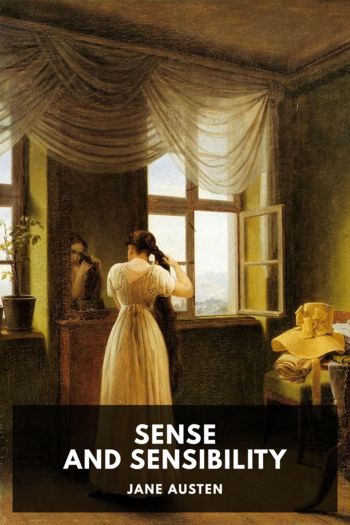Sense and Sensibility - Jane Austen (classic literature list txt) 📗

- Author: Jane Austen
Book online «Sense and Sensibility - Jane Austen (classic literature list txt) 📗». Author Jane Austen
She then went away, walking on tiptoe out of the room, as if she supposed her young friend’s affliction could be increased by noise.
Marianne, to the surprise of her sister, determined on dining with them. Elinor even advised her against it. But “no, she would go down; she could bear it very well, and the bustle about her would be less.” Elinor, pleased to have her governed for a moment by such a motive, though believing it hardly possible that she could sit out the dinner, said no more; and adjusting her dress for her as well as she could, while Marianne still remained on the bed, was ready to assist her into the dining room as soon as they were summoned to it.
When there, though looking most wretchedly, she ate more and was calmer than her sister had expected. Had she tried to speak, or had she been conscious of half Mrs. Jennings’s well-meant but ill-judged attentions to her, this calmness could not have been maintained; but not a syllable escaped her lips; and the abstraction of her thoughts preserved her in ignorance of everything that was passing before her.
Elinor, who did justice to Mrs. Jennings’s kindness, though its effusions were often distressing, and sometimes almost ridiculous, made her those acknowledgments, and returned her those civilities, which her sister could not make or return for herself. Their good friend saw that Marianne was unhappy, and felt that everything was due to her which might make her at all less so. She treated her therefore, with all the indulgent fondness of a parent towards a favourite child on the last day of its holidays. Marianne was to have the best place by the fire, was to be tempted to eat by every delicacy in the house, and to be amused by the relation of all the news of the day. Had not Elinor, in the sad countenance of her sister, seen a check to all mirth, she could have been entertained by Mrs. Jennings’s endeavours to cure a disappointment in love, by a variety of sweetmeats and olives, and a good fire. As soon, however, as the consciousness of all this was forced by continual repetition on Marianne, she could stay no longer. With a hasty exclamation of Misery, and a sign to her sister not to follow her, she directly got up and hurried out of the room.
“Poor soul!” cried Mrs. Jennings, as soon as she was gone, “how it grieves me to see her! And I declare if she is not gone away without finishing her wine! And the dried cherries too! Lord! nothing seems to do her any good. I am sure if I knew of anything she would like, I would send all over the town for it. Well, it is the oddest thing to me, that a man should use such a pretty girl so ill! But when there is plenty of money on one side, and next to none on the other, Lord bless you! they care no more about such things!”
“The lady then—Miss Grey I think you called her—is very rich?”
“Fifty thousand pounds, my dear. Did you ever see her? a smart, stylish girl they say, but not handsome. I remember her aunt very well, Biddy Henshawe; she married a very wealthy man. But the family are all rich together. Fifty thousand pounds! and by all accounts, it won’t come before it’s wanted; for they say he is all to pieces. No wonder! dashing about with his curricle and hunters! Well, it don’t signify talking; but when a young man, be who he will, comes and makes love to a pretty girl, and promises marriage, he has no business to fly off from his word only because he grows poor, and a richer girl is ready to have him. Why don’t he, in such a case, sell his horses, let his house, turn off his servants, and make a thorough reform at once? I warrant you, Miss Marianne would have been ready to wait till matters came round. But that won’t do nowadays; nothing in the way of pleasure can ever be given up by the young men of this age.”
“Do you know what kind of a girl Miss Grey is? Is she said to be amiable?”
“I never heard any harm of her; indeed I hardly ever heard her mentioned; except that Mrs. Taylor did say this morning, that one day Miss Walker hinted to her, that she believed Mr. and Mrs. Ellison would not be sorry to have Miss Grey married, for she and Mrs. Ellison could never agree.”
“And who are the Ellisons?”
“Her guardians, my dear. But now she is of age and may choose for herself; and a pretty choice she has made!—What now,” after pausing a moment, “your poor sister is gone to her own room, I suppose, to moan by herself. Is there nothing one can get to comfort her? Poor dear, it seems quite cruel to let her be alone. Well, by-and-by we shall have a few friends, and that will amuse her a little. What shall we play





Comments (0)